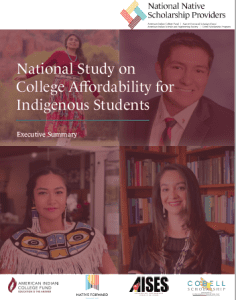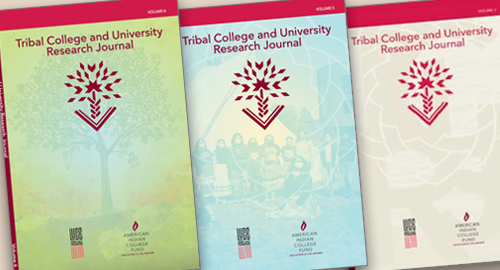Four National Native Scholarship Providers Release National Study on College Affordability for Indigenous Students
First-of-its kind collaborative research will increase Indigenous student visibility in higher education while informing effective practices of student support to increase student achievement.
August 17, 2022, Denver, Colo.— The National Native Scholarships Providers (NNSP) has released its first-ever National Study on College Affordability for Indigenous Students. The research and report, which were funded by a grant from Lumina Foundation, are the result of a collaboration of collection, data-sharing, analysis, and reporting between the nation’s four Native scholarship providers: the American Indian College Fund, the Cobell Scholarship, the American Indian Science and Engineering Society, and Native Forward Scholars Fund (formerly American Indian Graduate Center). Researchers have found the primary obstacle to college completion is affordability, causing overall college student attrition. Yet until NNSP’s research, the national data on the effect of college affordability on Indigenous students’ college completion had not been fully explored.
Only 36.2% of Indigenous students entering four-year colleges and universities in 2014 completed their academic degrees in six years, as compared to 60.1% of all other students. The NNSP’s goal in the research was to understand the integrated college-going experiences of Native scholars, their families, communities, Tribes, and how they viewed the promise of a post-secondary education—and how these factors played a role in their navigating college affordability.
Principal research staff from the NNSP organizations served as co-principal investigators for the project, with the support from Indigenous research faculty nationwide. Because of limited research available on the topic of college affordability for Indigenous students, the team used a mixed-method approach to provide a deeper understanding of student insights and experiences, including quantitative data (gained through surveys of former and current NNSP scholarship recipients) and qualitative data (gained through survey participants’ participation in individual interviews or sharing circles). The researchers applied for and received approval for the research with an Internal Review Board (IRB) application through the Northwest Indian College (NWIC) Institutional Review Board (IRB), the IRB of Record for the American Indian Higher Education Consortium (AIHEC).
The report is divided into subject-matter sections that include demographic and background data, Tribal affiliations, navigating personal finances to pay for education, financial aid and FAFSA completion, and debt accrual. Researchers also conducted an analysis of variables on affordability, such as food security, caretaking responsibilities, cultural experience, availability of off-campus housing, being the sole source of a family’s income, and more.
In addition to this ground-breaking research, the NNSP provided valuable practice and policy recommendations for higher education institutions, financial aid offices, secondary and pre-college education institutions, land grant colleges and universities, Native-American serving non-tribal colleges and universities, and national Non-Native scholarship providers. This research is the first step in the NNSP’s work to provide data to challenge the U.S. higher education system’s erasure of Indigenous people through its lack of collection of and attention to data inclusion at the campus and national levels. The NNSP identified the next steps for research on college affordability for Native students, including the impact of COVID-19, student loans, the impact of external scholarship on collegiate outcomes, and more.
Cheryl Crazy Bull, President and CEO of the American Indian College Fund, said, “We want the American public and policymakers to understand the unique barriers faced by Native students as they pursue their education dreams. These barriers can be removed through continued investment via scholarships, tuition support, and supportive partnerships. This study provides a foundation from which to explore those investments.”
Sarah EchoHawk, Chief Executive Officer of the American Indian Science and Engineering Society (AISES), said, “The incredible data produced by this national study will shed a more direct light on our Indigenous students and the financial barriers that they face along their educational journeys. This information not only allows AISES to better support our students’ financial needs, but it also provides deeper context to our overall mission goals as an organization. The collaborative efforts with the other National Native Scholarship Providers are truly remarkable in terms of the impact this work will have on our Indigenous students in Indian Country.”
Melvin E. Monette, CEO of the Cobell Scholarship Program administered by Indigenous Education, Inc., said, “Data on college affordability for Native students now has new national visibility due to our scholarship organizations’ powerful data and research collaboration. This ongoing Indigenous-centric research endeavor not only enables the Cobell Scholarship program to better understand and meet our scholars’ financial needs, it aligns with Elouise Cobell’s vision of making higher education more accessible to Native students throughout the U.S.”
Angelique Albert, CEO of Native Forward Scholars Fund, said, “This national study brings Native students’ voices to the forefront so we can begin to build the foundation for awareness, inclusion, and better understanding of the complexities of Native students’ journey through college. Collaborating with other nonprofits to form National Native Scholarship Providers is an important step in this process to explore college affordability, access to higher education, and the challenges Native students face, on and off campus.”
To download or read a copy of the report online, please visit: https://collegefund.org/NNSP_Affordability
Contacts:
- Dina Horwedel, J.D.
Director of Public Education, American Indian College Fund, 303-426-8900, dhorwedel@collegefund.org - Johnny Poolaw, Ph.D.
Director of Student Success, The American Indians in Science and Engineering Society, 720-758-9725, jpoolaw@aises.org - David Weber
Director of Marketing and Communications, Native Forward Scholars Fund, 505-205-1762, david@nativeforward.org - John L. Garland, Ph.D.
Director, Research and Student Success, The Cobell Scholarship Program, Indigenous Education, Inc., john.garland@cobellscholar.org
About the American Indian College Fund—The American Indian College Fund has been the nation’s largest charity supporting Native higher education for 33 years. The College Fund believes “Education is the answer” and provided $15.5 million in scholarships and other direct student support to American Indian students in 2020-21. Since its founding in 1989 the College Fund has provided more than $259 million in scholarships, programmatic and community support. The College Fund also supports a variety of academic and support programs at the nation’s 35 accredited tribal colleges and universities, which are located on or near Indian reservations, ensuring students have the tools to graduate and succeed in their careers. The College Fund consistently receives top ratings from independent charity evaluators and is one of the nation’s top 100 charities named to the Better Business Bureau’s Wise Giving Alliance. For more information about the American Indian College Fund, please visit https://collegefund.org.
Journalists—The American Indian College Fund does not use the acronym AICF. On second reference, please use the College Fund.
About AISES — Advancing Indigenous People in STEM—For 45 years, AISES has focused on substantially increasing the representation of Indigenous peoples of North America and the Pacific Islands in critically needed STEM (science, technology, engineering, math) disciplines. This robust nonprofit currently supports individual student and professional members across the U.S. and Canada through chartered college and university chapters, professional chapters, tribal chapters, and affiliated PK-12 schools. Members benefit from diverse STEM-focused programming that supports careers and promotes student success and workforce development in multiple crucial areas. To learn more visit https://aises.org/.
About The Cobell Scholarship Program, Indigenous Education, Inc.—Created in 2016 for the express purpose to administer the Cobell Scholarship Program, Indigenous Education, Inc. provides highly competitive scholarship and fellowship opportunities for Native vocational, undergraduate, and graduate students through empowering them with an impactful scholarship experience designed to support their success in higher education. The overarching mission and vision of Indigenous Education, Inc. is to support American Indian and Alaska Native student success. Since the program’s beginning, it has supported over 4000 students with more than $35,000,000 in scholarships to attend more than 400 colleges and universities worldwide. To learn more about, Ms. Cobell, IEI and the Cobell Scholarship, visit https://cobellscholar.org.
About Native Forward Scholars Fund – Native Forward Scholars Fund—As the nation’s longest-running scholarship provider for Native students, we have awarded over $350 million in direct scholarships since 1969 and have empowered over 20,000 students from over 500 Tribes in all 50 states. Native Forward is committed to creating an impact in Native communities by providing access to quality education for Native students. We believe higher education deepens our transformative impact on every part of society. Native Forward invests 95% of our resources directly into Native students’ higher education experience at 1,700+ institutions across the U.S. in undergraduate, graduate, and professional degree programs.
Our goal is to create opportunities for success for all Native people. Knowledge and experience are powerful tools that can advance and preserve our way of life. By honoring our history, we are creating our own brilliant future. We are Native Forward Scholars Fund. For more information, visit https://nativeforward.org.
Journalists — Native Forward Scholars Fund does not use the acronym NFSF. On second reference, please use the Native Forward.
Photo—The first-ever National Study on College Affordability for Indigenous Students released by the National Native Scholarships Providers (NNSP). The NNSP is comprised of the American Indian College Fund (College Fund), the American Indian Science and Engineering Society (AISES), the Cobell Scholarship Program administered by Indigenous Education, Inc., and Native Forward.












